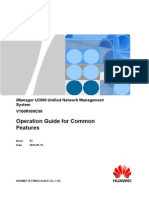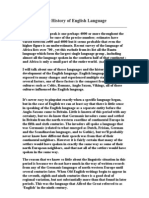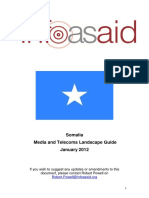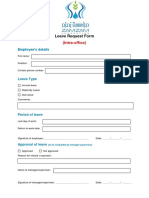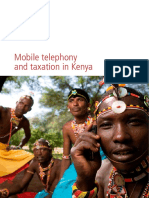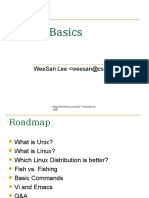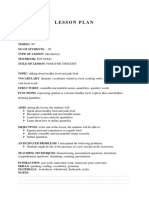History of Network
History of Network
Uploaded by
Mustaf MohamedCopyright:
Available Formats
History of Network
History of Network
Uploaded by
Mustaf MohamedOriginal Description:
Copyright
Available Formats
Share this document
Did you find this document useful?
Is this content inappropriate?
Copyright:
Available Formats
History of Network
History of Network
Uploaded by
Mustaf MohamedCopyright:
Available Formats
History of the English language From Wikipedia, the free encyclopedia English is a West Germanic language that originated
from the Anglo-Frisian dialects brought to Britain by Germanic invaders and/or settlers from various parts of what is now northwest Germanyand the Netherlands. Initially, Old English was a diverse group of dialects, reflecting the varied origins of the Anglo-Saxon kingdoms of Britain. One of these dialects, Late West Saxon, eventually became predominant. The English language underwent extensive change in the Middle Ages. Written Old English of AD 1000 is similar in vocabulary and grammar to other old Germanic languages such as Old High German and Old Norse, and completely unintelligible to modern speakers, while the modern language is already largely recognisable in written Middle English of AD 1400. The transformation was caused by two further waves of invasion: the first by speakers of the Scandinavian branch of the Germanic language family, who conquered and colonized parts of Britain in the 8th and 9th centuries; the second by the Normans in the 11th century, who spoke Old Norman and ultimately developed an English variety of this called Anglo-Norman. A large proportion of the modern English vocabulary comes directly from Anglo-Norman. Close contact with the Scandinavians resulted in a significant grammatical simplification and lexical enrichment of the Anglo-Frisian core of English. However, these changes had not reachedSouth West England by the 9th century AD, where Old English was developed into a full-fledged literary language. The Norman invasion occurred in 1066, and when literary English rose anew in the 13th century, it was based on the speech of London, much closer to the centre of Scandinavian settlement. Technical and cultural vocabulary was largely derived from Old Norman, with particularly heavy influence in the church, the courts, and government. With the coming of the Renaissance, as with most other developing European languages such as German and Dutch, Latinand Ancient Greek supplanted Norman and French as the main source of new words. Thus, English developed into very much a "borrowing" language with an enormously disparate vocabulary.
Proto-English[edit source | editbeta] The languages of Germanic peoples gave rise to the English language (the best known are the Angles, Saxons, Frisii, Jutes and possibly some Franks, who traded, fought with and lived alongside the Latin-speaking peoples of the Roman Empire in the centuries-long process of the Germanic peoples' expansion into Western Europe during the Migration Period). Latin loan words such aswine, cup, and bishop entered the vocabulary of these Germanic peoples before their arrival in Britain and the subsequent formation of England.[1] The Anglo-Saxon Chronicle relates that around the year 449 Vortigern, King of the Britons, invited the "Angle kin" (Angles allegedly led by the Germanic brothers Hengist and Horsa) to help repel invading Picts. In return, the Anglo-Saxons received lands in the southeast of Britain. In response "came men of Ald Seaxum of Anglum of Iotum" (Saxons, Angles and Jutes). The Chronicle refers to waves of settlers who eventually established seven kingdoms, known as the heptarchy. Modern scholars view Hengist and Horsa as Euhemerised deities from AngloSaxon paganism, who ultimately stem from the religion of the Proto-Indo-Europeans.[2]
Old English from the mid-5th century to the mid-11th century After the Anglo-Saxon invasion, the Germanic language possibly displaced the
indigenous Brythonic languages and Latin in most of the areas of Great Britain that later became England. The original Celtic languages remained in parts
of Scotland, Wales and Cornwall (where Cornish was spoken into the 19th century), although large numbers of compound Celtic-Germanic placenames survive, hinting at early language mixing.[3] Even then, Old English continued to exhibit local variation, the remnants of which continue to be found in dialects of Modern English.[4] The most famous surviving work from the Old English period is the epic poem Beowulf composed by an unknown poet. Old English varied widely from modern Standard English. Native English speakers today would find Old English unintelligible without studying it as a separate language. Nevertheless, English remains a Germanic language, and approximately half of the most commonly used words in Modern English have Old English roots. The words be, strong and water, for example, derive from Old English. Many non-standard dialects such as Scots andNorthumbrian English have
retained features of Old English in vocabulary and pronunciation.[5] Old English was spoken until some time in the 12th or 13th century.[6][7] The introduction of Christianity late in the 6th century encouraged the addition of over 400 Latin loan words, such as priest, paper, and school, and fewer Greek loan words.[9] The Old English period formally ended some time after the Norman conquest (starting in 1066 AD), when the language was influenced to an even greater extent by the Normans, who spoke a French dialect calledOld Norman. The use of Anglo-Saxon to describe a merging of Anglian and Saxon languages and cultures is a relatively modern development. Middle English from the late 11th to the late 15th century For centuries following the Norman Conquest in 1066, the Norman kings and high-ranking nobles spoke one of the French langues d'ol, that we call Anglo-Norman, a variety of Old Norman used inEngland and to some extent elsewhere in the British Isles during the AngloNorman period and originating from a northern langue d'ol dialect. Merchants and lower-ranked nobles were often bilingual in Anglo-Norman and English, whilst English continued to be the language of the common people. Middle English was influenced by both Anglo-Norman and, later, Anglo-French (seecharacteristics of the Anglo-Norman language). In this period, the French language was regarded like an official language in England, but this tendency would disappear in the 14th century.[10] While the Anglo-Saxon Chronicle continued until 1154, most other literature from this period was in Old Norman or Latin. A large number of Norman words were taken into Old English, with many doubling for Old English words. The Norman influence is the hallmark of the linguistic shifts in English over the period of time following the invasion, producing what is now referred to as Middle English. English literature reappeared after 1200, when a changing political climate and the decline in Anglo-Norman made it more respectable. The Provisions of Oxford, released in 1258, was the first English government document to be published in the English language after the Norman Conquest. In 1362, Edward III became the first king to address Parliament in English. By the end of the century, even the royal court had switched to English. Anglo-Norman remained in use in limited circles somewhat longer, but it had ceased to be a living language.
English spelling was also influenced by Norman in this period, with the // and // sounds being spelled th rather than with the Old English letters (thorn) and (eth), which did not exist in Norman. These letters remain in the modern Icelandic alphabet, having been borrowed from Old English viaWestern Norwegian. Early Modern English from the late 15th to the late 17th century The English language underwent extensive sound changes during the 1400s, while its spelling conventions remained rather constant. Modern English is often dated from the Great Vowel Shift, which took place mainly during the 15th century. English was further transformed by the spread of a standardised London-based dialect in government and administration and by the standardising effect of printing. Consequent to the push toward standardization, the language acquired self-conscious terms such as "accent" and "dialect".[13] By the time of William Shakespeare (mid 16th - early 17th century),[14] the language had become clearly recognisable as Modern English. In 1604, the first English dictionary was published, the Table Alphabeticall. Increased literacy and travel have facilitated the adoption of many foreign words, especially borrowings from Latin and Greek since the Renaissance. (In the 17th century, Latin words were often used with the original inflections, but these eventually disappeared). As there are many words from different languages and English spelling is variable, the risk of mispronunciation is high, but remnants of the older forms remain in a few regional dialects, most notably in the West Country. During the period, loan words were borrowed from Italian, German, and Yiddish. British acceptance of and resistance to Americanisms began during this period.[15] Modern English from the late 17th century to the present[edit source | editbeta] The Dictionary of the English Language was the first full featured English dictionary. Samuel Johnson published the authoritative work in 1755. To a high degree, the dictionary standardized both English spelling and word usage. Meanwhile, grammar texts by Lowth, Murray, Priestly, and others attempted to prescribe standard usage even further. Early Modern English and Late Modern English vary essentially in vocabulary. Late Modern English has many more words, arising from the Industrial Revolution and the technology that created a need for new words as well as international development of the language. The British Empire at its height covered one quarter of the Earth's surface, and the English language adopted
foreign words from many countries. British English and American English, the two major varieties of the language, are spoken by 400 million persons. Received Pronunciation of British English is considered the traditional standard, while General American English is more influential. The total number of English speakers worldwide may exceed one billion.[16] Phonological changes Grammatical changes The English language once had an extensive declension system English distinguished similar to Latin, between
modern German or Icelandic. Old
thenominative, accusative, dative, and genitive cases, and for strongly declined adjectives and some pronouns also a separate instrumental case (which otherwise and later completely coincided with the dative). In addition, the dual was distinguished from the more modern singular and plural.[17]Declension was greatly simplified during the Middle English period, when the accusative and dative cases of the pronouns merged into a single oblique case that also replaced the genitive case after prepositions. Nouns in Modern English no longer decline for case, except for the genitive. Evolution of English pronouns[edit source | editbeta] "Who" and "whom", "he" and "him", "she" and "her", etc. are a conflation of the old accusative and dative cases, as well as of the genitive case after prepositions. This conflated form is called theoblique case, or the object (objective) case because it is used for objects of verbs (direct, indirect, or oblique) as well as for objects of prepositions. (See object pronoun.) The information formerly conveyed by having distinct case forms is now mostly provided by prepositions and word order. In Old English as well as modern German and Icelandic as further examples, these cases had distinct forms. Although the traditional terms accusative and dative continue to be used by some grammarians, these are roles rather than actual cases in Modern English. That is, the form whom may play accusative or dative roles (or instrumental or prepositional roles), but it is a
single morphological form and therefore a single case, contrasting with nominative who and genitive whose. Many grammarians use the more intuitive labels 'subjective', 'objective', and 'possessive' for nominative, oblique, and genitive pronouns.
Modern English nouns distinguish only one case from the nominative, the possessive case, which some linguists argue is not a case at all, but a clitic (see the entry for genitive case for more information).
You might also like
- Adolescent Literacy Position StatementDocument18 pagesAdolescent Literacy Position Statementapi-380499922No ratings yet
- A Brief History of The English Language - Final Version With Study GuideDocument8 pagesA Brief History of The English Language - Final Version With Study GuideRaul Quiroga100% (1)
- Huawei IManager U2000 Operation Guide For Common FeaturesDocument1,284 pagesHuawei IManager U2000 Operation Guide For Common FeaturesMustaf Mohamed100% (3)
- An Investigation Into Monumental ArchitectureDocument30 pagesAn Investigation Into Monumental ArchitectureWilliam StobbartNo ratings yet
- Proto EnglishDocument9 pagesProto EnglishnaderfghNo ratings yet
- EnglishDocument20 pagesEnglishGodwin EzekielNo ratings yet
- Ingles ExpoDocument10 pagesIngles ExpoEduardo GranadosNo ratings yet
- History of The English LanguageDocument2 pagesHistory of The English LanguageSyed Fateh Ali ShahNo ratings yet
- History of English LanguageDocument3 pagesHistory of English LanguageMadalina Irina Agafitei0% (1)
- The Origins of The English Language 55b0fa844fd76 PDFDocument16 pagesThe Origins of The English Language 55b0fa844fd76 PDFಪವನ್ ಕಲಾಶಂಕರ್No ratings yet
- Assignment History ofDocument7 pagesAssignment History ofevanshjtNo ratings yet
- PPT-2 History of Eng, Lang - Middle PRDDocument16 pagesPPT-2 History of Eng, Lang - Middle PRDMemon Memon100% (1)
- History of English Language 1Document6 pagesHistory of English Language 1Joniele Angelo AninNo ratings yet
- English HomeworkDocument3 pagesEnglish HomeworkMelany CastilloNo ratings yet
- From Old English To Modern EnglishDocument8 pagesFrom Old English To Modern EnglishAndrada Trandafir100% (1)
- The Orgin and Growth of English LanguageDocument6 pagesThe Orgin and Growth of English LanguageKishore Right100% (1)
- Referat EnglezaDocument4 pagesReferat EnglezaGabrielNo ratings yet
- Agafitei Madalina - The Story of EnglishDocument3 pagesAgafitei Madalina - The Story of EnglishMadalina Irina AgafiteiNo ratings yet
- Rawan Saqer TMA 1Document6 pagesRawan Saqer TMA 1dawnirad08No ratings yet
- English Language TrabajoDocument4 pagesEnglish Language TrabajoAlejandro vogtNo ratings yet
- English HistoryDocument9 pagesEnglish HistoryAriyanti Hasby100% (1)
- A Brief History of EnglishDocument6 pagesA Brief History of EnglishAngel Kate Politud100% (2)
- История англ языкаDocument12 pagesИстория англ языкаKira KimNo ratings yet
- 10 What Is English As Short History of Its DevelopmentDocument6 pages10 What Is English As Short History of Its Developmentvanessa777100% (1)
- History of English: From Wikipedia, The Free EncyclopediaDocument1 pageHistory of English: From Wikipedia, The Free EncyclopediasupositionNo ratings yet
- The Origins and Development of The English LanguageDocument5 pagesThe Origins and Development of The English LanguageAnis Wardah100% (2)
- Naval Architecture DeptDocument5 pagesNaval Architecture DeptMjKJ100% (1)
- UNIT I History of English LanguageDocument4 pagesUNIT I History of English LanguageSyeda KhadijaNo ratings yet
- ĐA DẠNG TIẾNG ANHhDocument18 pagesĐA DẠNG TIẾNG ANHhTiênn NhiiNo ratings yet
- ĐA DẠNG TIẾNG ANHDocument14 pagesĐA DẠNG TIẾNG ANHTiênn NhiiNo ratings yet
- HistoryOfEnglish RicoDocument1 pageHistoryOfEnglish RicoRico, Maria NicoleNo ratings yet
- History of The English Language EssayDocument5 pagesHistory of The English Language EssayBrockNo ratings yet
- Brief History of EnglishDocument2 pagesBrief History of EnglishSimona DudasNo ratings yet
- EvoluciónDocument2 pagesEvoluciónDeborah DuranNo ratings yet
- The History of English LanguageDocument5 pagesThe History of English LanguageOsama Bin Amer75% (4)
- English Language HistoryDocument4 pagesEnglish Language HistoryLim ZY100% (1)
- AE4311 Week 2: World EnglishesDocument5 pagesAE4311 Week 2: World EnglishesWafaa Yohanna SharianaskhanováNo ratings yet
- History of EnglishDocument4 pagesHistory of EnglishEd RushNo ratings yet
- English Is A: Lingua FrancaDocument16 pagesEnglish Is A: Lingua Francaavtechno100% (1)
- What Is EnglishDocument4 pagesWhat Is EnglishSong Ji HyoNo ratings yet
- Classification: Anglic LanguagesDocument5 pagesClassification: Anglic Languagesnina.khechikashviliNo ratings yet
- College EnglishDocument7 pagesCollege EnglishYanyan OrozcoNo ratings yet
- A Short History of The Origins and Development of EnglishDocument21 pagesA Short History of The Origins and Development of EnglishNati Antunez100% (3)
- History of The English LanguageDocument5 pagesHistory of The English LanguageMukmin RazaniNo ratings yet
- The History of EnglishDocument7 pagesThe History of Englishtanpopo_chanNo ratings yet
- Title: The History of English Language: Tracings Its Origins and Early InfluencesDocument5 pagesTitle: The History of English Language: Tracings Its Origins and Early InfluencesFaiza AijazNo ratings yet
- History of The English LanguageDocument1 pageHistory of The English LanguageViara IvanovaNo ratings yet
- BARANQUIL - Module 3Document1 pageBARANQUIL - Module 3Cyril Denise BaranquilNo ratings yet
- English Is A: Lingua FrancaDocument15 pagesEnglish Is A: Lingua FrancaavtechnoNo ratings yet
- History of English Lecture 1Document33 pagesHistory of English Lecture 1Влада100% (1)
- What Is EnglishDocument5 pagesWhat Is Englishdariusxavier08No ratings yet
- History of EnglishDocument9 pagesHistory of Englishlydiaadomako400No ratings yet
- Work English LanguageDocument12 pagesWork English LanguageJose Moises MoisesNo ratings yet
- Powerpoint History of EnglishDocument21 pagesPowerpoint History of Englishapi-152110312100% (1)
- A Short History of The Origins and Development of EnglishDocument21 pagesA Short History of The Origins and Development of EnglishMichael Ronald Smith100% (1)
- Middle EnglishDocument9 pagesMiddle EnglishMar Resina GeradaNo ratings yet
- Lingua Franca: English Is ADocument4 pagesLingua Franca: English Is ASalley Sato Ramsis AjavanNo ratings yet
- ინგლისური ენის ისტორიის რენდომ გამოცდაDocument27 pagesინგლისური ენის ისტორიის რენდომ გამოცდაsalome oniashviliNo ratings yet
- History of English LanguageDocument7 pagesHistory of English Languageapi-3741779100% (2)
- Outline of the history of the English language and literatureFrom EverandOutline of the history of the English language and literatureNo ratings yet
- May We Borrow Your Language?: How English Steals Words From All Over the WorldFrom EverandMay We Borrow Your Language?: How English Steals Words From All Over the WorldRating: 4 out of 5 stars4/5 (4)
- GSM BSS Optimization: Elnaz YaghoubiDocument73 pagesGSM BSS Optimization: Elnaz YaghoubiSaNo ratings yet
- Mobile Telephone and TaxationDocument92 pagesMobile Telephone and TaxationMustaf MohamedNo ratings yet
- Leave Application FormDocument1 pageLeave Application FormMustaf MohamedNo ratings yet
- Mobiletelephoneandtaxationinkenya PDFDocument50 pagesMobiletelephoneandtaxationinkenya PDFMustaf MohamedNo ratings yet
- Job Analysis and Skills Assessments Pharmacy AssistantDocument2 pagesJob Analysis and Skills Assessments Pharmacy AssistantMustaf MohamedNo ratings yet
- Digital Microwave Communication PrinciplesDocument113 pagesDigital Microwave Communication PrinciplesMustaf MohamedNo ratings yet
- SoftClinic BrochureDocument1 pageSoftClinic BrochureMustaf MohamedNo ratings yet
- Silent Calls - Causes and Measurements: Kamil Baran, Paweł Cegłowski, and Sławomir KulaDocument3 pagesSilent Calls - Causes and Measurements: Kamil Baran, Paweł Cegłowski, and Sławomir KulaMustaf MohamedNo ratings yet
- Telemedicine and E-Health The South African ExperienceDocument25 pagesTelemedicine and E-Health The South African ExperienceMustaf MohamedNo ratings yet
- Ttta Id CardDocument1 pageTtta Id CardMustaf MohamedNo ratings yet
- 01 Linux BasicsDocument20 pages01 Linux BasicsRanganathan NagendranNo ratings yet
- Genex Assistant Operation Guide LteDocument47 pagesGenex Assistant Operation Guide LteMustaf MohamedNo ratings yet
- Topic 4 Roles of Curr WorkerDocument8 pagesTopic 4 Roles of Curr Workerruffmyza100% (7)
- Kod: Gec103 WK 9: English For Effective CommunicationDocument32 pagesKod: Gec103 WK 9: English For Effective CommunicationBM3-0620 Jalianah Binti LongNo ratings yet
- Determine The Personality and Interest of Ss3 Students of Demonstration Secondary School of Ahamdu Bello University, ZariaDocument40 pagesDetermine The Personality and Interest of Ss3 Students of Demonstration Secondary School of Ahamdu Bello University, ZariaabdulamlikNo ratings yet
- SDLP Week 2 Grade 8Document4 pagesSDLP Week 2 Grade 8Marvin Dale Regala NuñezNo ratings yet
- 25 Leadership Qualities That Makes You A Good LeaderDocument31 pages25 Leadership Qualities That Makes You A Good LeaderMarcela Consigo RamosNo ratings yet
- Functional LiteracyDocument7 pagesFunctional LiteracyNiño Dizon EstolasNo ratings yet
- Lesson Plan For Dr. Beup's Class PresentationDocument2 pagesLesson Plan For Dr. Beup's Class PresentationJose Erwin BorbonNo ratings yet
- Faculty of CommerceDocument4 pagesFaculty of CommerceAnannya GirmeNo ratings yet
- Introduction To Organizational BehaviorDocument6 pagesIntroduction To Organizational BehaviorRajeev SubediNo ratings yet
- Autonomy in Language LearningDocument2 pagesAutonomy in Language LearningFellype Diorgennes Cordeiro GomesNo ratings yet
- Neutralization.?!: The Phonetics - Phonology Issue in The Analysis of Word-Final Obstruent Voicing Klaus J. KohlerDocument12 pagesNeutralization.?!: The Phonetics - Phonology Issue in The Analysis of Word-Final Obstruent Voicing Klaus J. KohlerWaleed MohammadNo ratings yet
- Social Psychology Part 1Document32 pagesSocial Psychology Part 1M. Amebari NongsiejNo ratings yet
- Litnum ProgressionsDocument15 pagesLitnum ProgressionsCharles MugasaNo ratings yet
- Smith 2008Document19 pagesSmith 2008Thomas VangelisNo ratings yet
- Alben - Quality of ExperienceDocument6 pagesAlben - Quality of ExperienceLeonardo Andres Vargas EspinozaNo ratings yet
- Technical English For ArchitectsDocument2 pagesTechnical English For ArchitectsJuan Londoño100% (1)
- Action Research - Julius Victor R. ProntoDocument13 pagesAction Research - Julius Victor R. ProntoCarl Dionne B. PuyatNo ratings yet
- The Origins of Language Curriculum DevelopmentDocument29 pagesThe Origins of Language Curriculum DevelopmentFitrianahNo ratings yet
- Referat Engleza Bîrlea Stelian DanielDocument4 pagesReferat Engleza Bîrlea Stelian Danieldany_abrud_154875512No ratings yet
- Mastering Machine Learning - A Comprehensive GuideDocument19 pagesMastering Machine Learning - A Comprehensive GuideVenkat NarayananNo ratings yet
- Eng 151Document4 pagesEng 151nmnovaraNo ratings yet
- Portfolio Q4 by BagiosoDocument30 pagesPortfolio Q4 by BagiosoJames AbendanNo ratings yet
- Double Negatives in ELTDocument5 pagesDouble Negatives in ELTmăruţaNo ratings yet
- Positive ThinkingDocument11 pagesPositive ThinkingMohamed ChakouriNo ratings yet
- Towards The Contextualization Teaching of The Speaking Skill: From An Esp Perspective. AuthorDocument9 pagesTowards The Contextualization Teaching of The Speaking Skill: From An Esp Perspective. AuthorAndres FNo ratings yet
- Tarea 2 Primer Parcial Iii ModuloDocument5 pagesTarea 2 Primer Parcial Iii ModuloOscar Andoni FuentesNo ratings yet
- Unit 13Document30 pagesUnit 13Priscilla SamaniegoNo ratings yet
- Lesson Plan: TH THDocument5 pagesLesson Plan: TH THmoni_76No ratings yet


